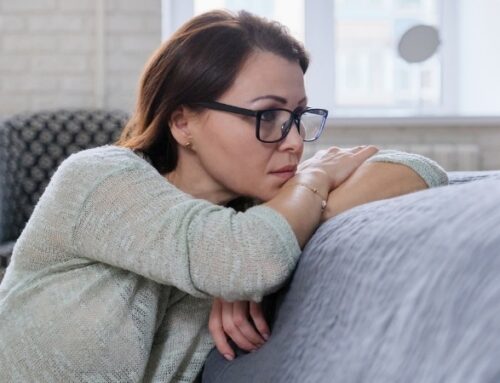Anxiety is your body’s natural way of responding to stress. It is caused by a feeling of fear or apprehensiveness of what is going to come. It is common for people to become anxious on occasion in social situations, whether it be interviewing for a new job or giving a speech in front of people. Most of the time, the anxiety can be dealt with no problem. But what if the anxiety creates such an intense fear within you that it is disrupting your life?

What Causes Social Anxiety?
Despite what you may think, social anxiety is a very common thing that many people deal with. A lot of people struggle with these fears, but the types of situations that trigger social anxiety can be different. According to the Anxiety & Depression Anxiety Association:
Anxiety disorders are the most common mental illness in the U.S., affecting 40 million adults in the United States age 18 and older, or 18.1% of the population every year.
Social anxiety can be triggered by fear that you will be watched, judged or embarrassed in public. Maybe you’re afraid others will think badly of you or that you wont measure up in comparison to other people. Even though you know these fears are irrational, you still can’t help but feel anxious because of it.
Some people experience mild social anxiety in various social situations. For other people, certain situations can trigger sever and deliberating anxiety symptoms. Below are some examples of situations where a person may experience social anxiety:
- Meeting new people
- Making small talk
- Performing/speaking on stage
- Being watched while doing something
- Feeling like the center of attention
- Being criticized
- Talking with authority figures or “important people”
- Being called upon
- Using public restrooms
- Being in highly crowded areas
- Taking exams
- Making phone calls
- Eating in public
- Going on a date
- Attending social gatherings
Social Anxiety Signs and Symptoms
Like previously mentioned, many people feel self-conscious or shy every once in a while, but it doesn’t usually get in the way of their everyday life. Social anxiety disorder however, will get in the way of a persons normal life and can cause incredible distress. There are physical, emotional, and behavioral signs and symptoms associated with anxiety. The physical signs and symptoms include:
- Blushing
- Shortness of breath
- Racing heart or tightness in your chest
- Nausea
- Sweating and hot flashes
- Feeling dizzy
- Shaking or trembling
- Restlessness
Emotional signs and symptoms may include:
- Excessive anxiety in every day settings
- Extreme worrying for long periods of time regarding a social situations
- Intense fear of being watched or judged by people, especially strangers
- Fear of embarrassment or humiliation
- Fear that other people will notice that you are nervous
Behavioral signs and symptoms include:
- Avoiding social situations to an extent that is disrupts your life
- Staying hidden or quiet in the background in order to go unnoticed
- The need to always bring someone with you wherever you go
- Drinking before social situations to calm your nerves
Therapy for Anxiety
Exposure and Response Prevention (ERP) is one of the most effective treatments for anxiety disorders and is based on Cognitive-Behavioral Therapy (CBT). CBT is based on the idea that your thoughts (cognitions) influence the way you feel (your emotions) and the way you, subsequently behave in various situations. Therefore, if you self-talk is negatively or fear based, negative emotional responses will ensure which will keep you in behavioral avoidance mode, there are three things causing factors: the way you think, feel, and behave.
Exposure and Response Prevention is an evidence-based treatment for reducing and even eliminating distressful physical symptoms and obsessive thinking to triggers that keep one in a perpetual state of alarm and distress while promoting increased tolerance and acceptance of that which feels uncomfortable. It promotes a healthy alternative to fear and a more adaptive approach to uncomfortable feelings.
Exposure and Response Prevention focuses on the notion that if you are afraid, you must face that fear head on in order to learn the best way you can handle it. Avoiding what you are afraid of doesn’t solve the problem and can even make your anxiety worse. ERP is the main focus in regards to anxiety disorder because behavioral change is the only way to really determine whether a person is still anxious in a fearful situation. By learning to face your fears and actively practicing how to cope in real life situations will your anxiety decrease and potentially diminish completely.

You don’t have to go it alone
At The Counseling Center for Growth and Recovery, we truly focus on how to overcome you social anxiety with Exposure and Response Prevention, not just how you think and why you feel the way you do like many other therapies do. We also offer a support group for those who suffer from anxiety where you can safely explore your fears and anxieties with other people who suffer from the same things you do. You will the opportunity to practice new skills and behaviors to support your growth and overcome your ears while making connections with other people with whom you can relate. Now is the time to call and get the help you need to have a more successful and thriving life!





